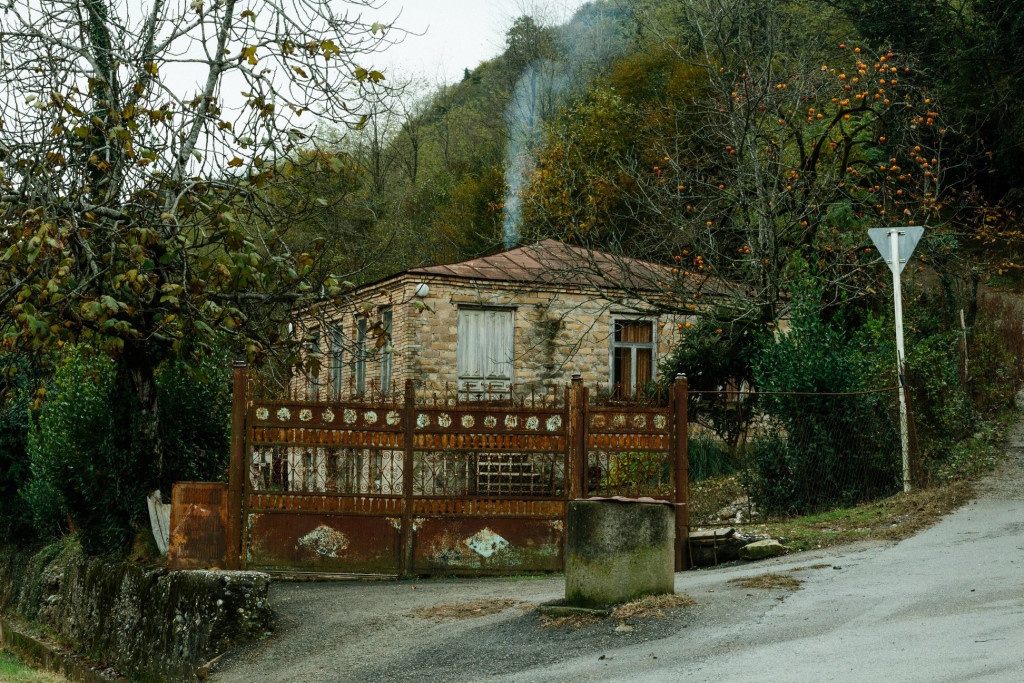Georgia: guardians of the Rioni Valley face off the dams
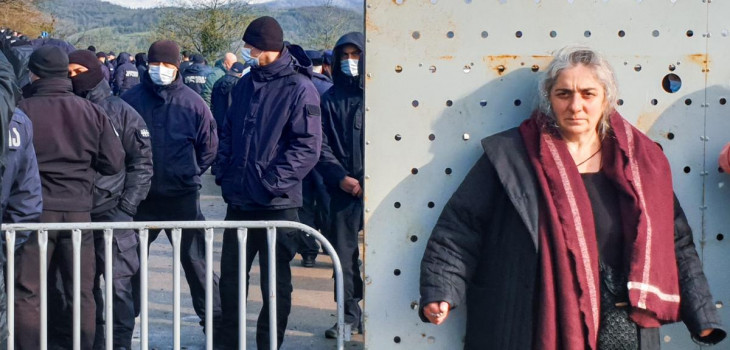
“My struggle has become to take back the land”
by Mariam Shengelia and Pierre Bonnevalle. A previous version of this article was published in French in the journal CQFD
See also: key facts on ENKA, the main company behind the Rioni Valley dams project.
The inhabitants of the Racha-Lechkhumi valley in Georgia are mobilising against the construction of two hydroelectric dams that are set to ravage an entire region – drowning three villages, destroying vineyards and local cultural heritage. Since last October they have been organising to take back the land and put an end to this dangerous mega-project.
Racha-Lechkhumi is a region in the northwest of Georgia, the valley of the river Rioni as it flows down from the peaks of the Caucasus Mountains. For the valley’s inhabitants the Rioni is the generous benefactor of the land, a divine blessing to be safeguarded. On its banks, the river’s flow creates a microclimatic zone concentrated around the village of Tvishi, nurturing lush soil for the vine, the sacred plant which can be found in every garden in the valley. Local winegrowing and farming traditions, which meet here in an intimate relationship with nature and beliefs, are now threatened by the construction of the vast dams.
1500 hectares under threat
The project’s name, Namakhvani Cascade appears designed to evoke images of wild and untouched landscape. In reality it means the construction of two hydroelectric dams – Zemo Namakhvani (upper Namakhvani) and Kvemo Namakhvani (lower Namakhvani) – with a total planned capacity of 400 megawatts. The Zemo Namakhvani dam will be located in the territory of the village of Tvishi. Marita, one of the valley guardians, says – “they invented this name for this project so as not to mention the village Tvishi, known for its microclimate and vineyards.”
Plans for energy engineering in the Rioni Valley date back to the Soviet era, but it was in 2015 that the Georgian government began planning this major construction project, contracted to a company that is 90% owned by the Turkish corporation ENKA. This is the largest hydroelectric project on Georgian territory since the end of the USSR. It will take up 1,500 hectares, transforming the Rioni Valley with no possibility of return.
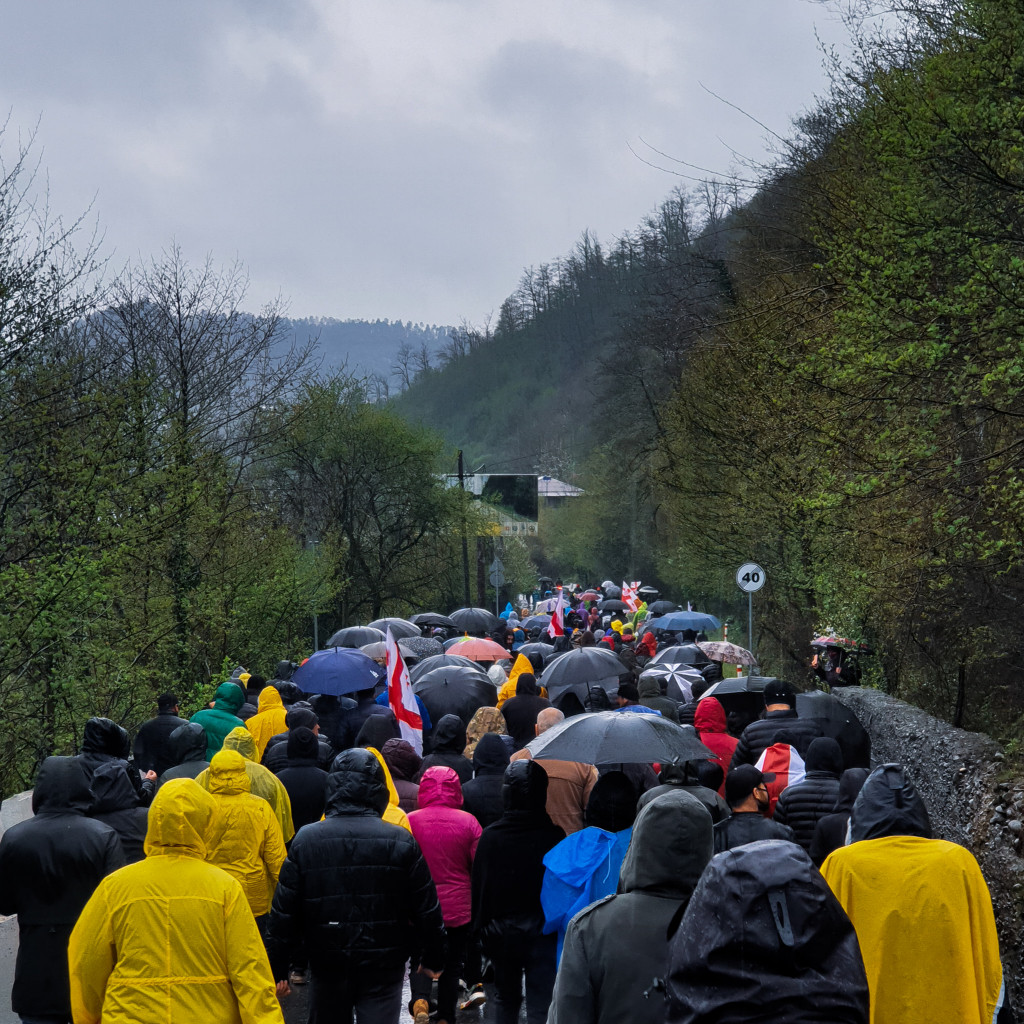
Increased geological and ecological risks
The valley’s guardians argue that the project will cause significant damage to the natural environment and local cultural heritage. The water reservoir created by flooding part of the valley will cover 520 hectares. Three villages will be drowned, expropriating 1001 families, as well as flooding agricultural land and several dozen historical monuments and archaeological sites.
That’s not all. As the region is seismically highly active, the increased risk of landslides could be disastrous. According to the Institute of Earth Sciences of Ilia State University, in the event of earthquake damage to the planned 105-metre dam upstream of Zhoneti, a 34-metre-high wave could reach Kutaisi in 19 minutes and cause flooding in 18 districts in the west of the country.
The change in microclimate will have irreparable effects on local grape crops. The forced relocation and loss of agricultural land will result in the disappearance of unique agricultural and winemaking traditions. In particular, the Tsolikauri grape, which produces a semi-dry white wine, is the main source of income for the people of Tvishi.
The inhabitants also complain that the authorities did not even deign to respect their own Environmental Assessment Code. In principle, building permits should not have been awarded before environmental impact reports were completed and published. But, with permission from the Ministry of Economy, work started on the Kvemo Namakhvani area before the company had assessed environmental impacts of work on Zemo Namakhvani. “That’s completely absurd,” Marita sighs.
An inter-generational struggle that does not weaken
Now valley inhabitants have taken matters into their own hands, beginning an occupation of the Zemo Namakhvani site on 24 October 2020. A tent camp was set up, while inhabitants and supporters coming from further afield have been organising vigils, cooking together, creating gardens, singing Georgian polyphonic songs and sending videos on social networks. Every night dozens of people are present to keep watch and prevent the start of construction work. The occupation has mobilised the villagers – uniting neighbours, family members, children and the elderly. “The youngest is 10 years old, the oldest 75 years old”, Marita continues with a smile.
For the valley’s guardians, the engagement is total – it means defending their places and ways of life, nature, the land, the water, and their beliefs. As Marita sums up: “If there is no land and no valley, what good is the rest? We, the inhabitants of this valley, cannot give in to this threat!”
Their forms of action are often closely linked to local religious beliefs. Orthodox Christians, the inhabitants erected a wooden cross on the site as a symbolic act to impede construction. The cross was torn down by the police who declared the site to be private property. “We are no longer allowed to step foot on our own traditional spaces. Everywhere they tell us – private property!” says Maka.
This fight led by locals has been joined by different collectives, ecological associations, and people coming to support them from different regions of Georgia. Georgian emigrants abroad send videos of support to the mobilised people. “Even the Abkhazians contact us”, underlines Maka, another guardian of the valley, with victorious pleasure. The Abkhazians are an ethnic minority living in a region occupied by Russia since 1994. “Every misfortune has its reverse side, she says. “Wonders are happening before my eyes.”
The inhabitants dream of a convergence of struggles between different populations mobilised against dams under construction in nearby regions. Marita comments, determined:
“We are in contact with the Kists (ethnic and religious minorities in Georgia). We are trying to set up a coordination of struggles with the people of Zemo-Svanety (Upper Svanety), I hope that we will succeed in organising this together.”
Numerous demonstrations have been held in Namakhvani, as well as in the capital Tbilisi and in Kutaissi, the largest city in western Georgia. Since 11 April rage has risen and spontaneous actions multiplied after the tents of the guardians were evacuated by police, their carefully landscaped garden ransacked, leaving only the land eaten away by tractors.
On 14 April the police erected a grey metal wall blocking the Rioni valley road to prevent people reaching the site. This border, drawn through the village of Goumati, separates the town of Koutaissi from the valley. On 24 April a wave of demonstrations took place in 17 towns in Georgia to support the local struggle, demanding that the government break the contract with ENKA, and that ENKA leave the Rioni Valley for good.
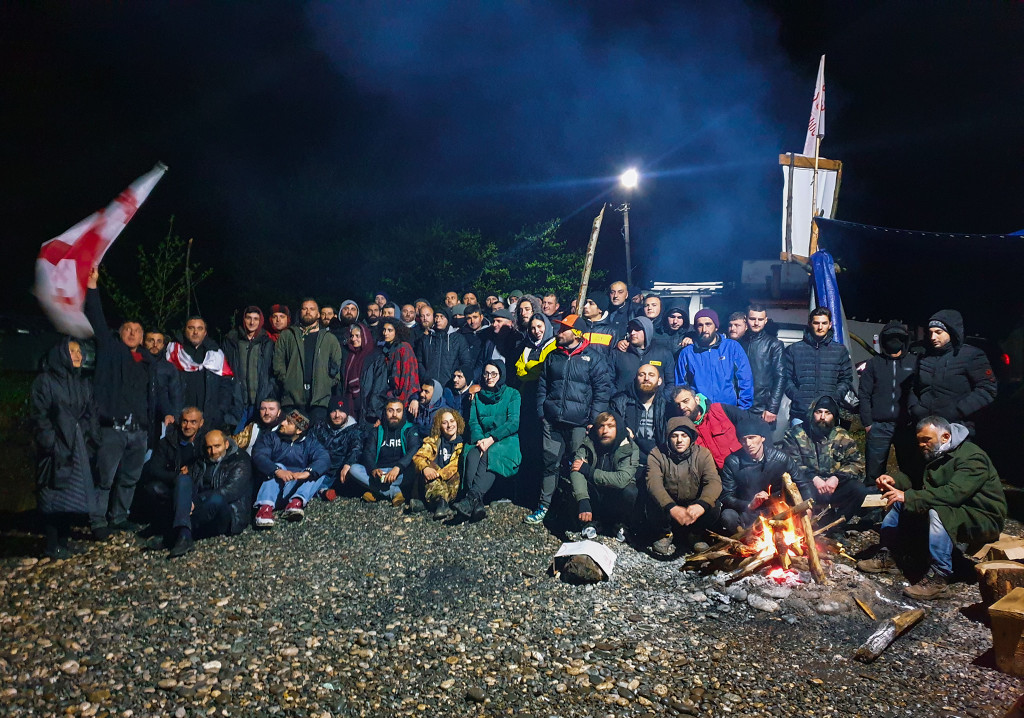
Organised plunder
The contract between the government and the company was only made public when Ifactimereti, the regional news agency, published a document that the government had tried to conceal from its population. Under the guise of energy autonomy and so-called “sustainable development”, the Georgian government, in collaboration with a foreign investor, is despoiling the natural common good.
This is by no means the first time that Georgia, as a “peripheral country”, is targeted for exploitation by global capital. In 2003, the arrival of the neoliberal, anti-socialist Saakashvili government enshrined the promotion of economic imperialism as the foundation of its power. Since 2013 the Georgian Dream party has headed the country, taking the same neoliberal direction.
The government signed the contract with the Turkish company ENKA long before any construction permit was obtained. The contract gives ENKA the right to operate the hydroelectric plant for 99 years. It also involves privatising a swathe of natural resources for the benefit of the company. In 2019, 325 hectares of forest and non-agricultural land were transferred to ENKA for the grand sum of 121 Gel (30 euros). It will have a lease to use another 283 hectares of land for 99 years for a fee of 16 Gel (4 euros) per year.
For 15 years, Maka has been fighting for the defence of the valley. She bears in mind the fights of her mother, one of the first to rise against previous dam projects in the valley. While initially ecological concerns were at the heart of her struggle, she realises that the urgent political task now is to defend the land: “Now, my fight has become to take back the land!”
Some inhabitants have received offers of 200,000 GEL (50,000 euros) to buy their houses and land. For Marita, these are “miserable” proposals:
“The compensation amount only corresponds to the value of your property, and does not take into account the changes in your lifestyle, the effects of the project on farming.”
Now valley inhabitants have taken matters into their own hands, beginning an occupation of the Zemo Namakhvani site on 24 October 2020. A tent camp was set up, while inhabitants and supporters coming from further afield have been organising vigils, cooking together, creating gardens, singing Georgian polyphonic songs and sending videos on social networks. Every night dozens of people are present to keep watch and prevent the start of construction work. The occupation has mobilised the villagers – uniting neighbours, family members, children and the elderly. “The youngest is 10 years old, the oldest 75 years old”, Marita continues with a smile.
For the valley’s guardians, the engagement is total – it means defending their places and ways of life, nature, the land, the water, and their beliefs. As Marita sums up: “If there is no land and no valley, what good is the rest? We, the inhabitants of this valley, cannot give in to this threat!”
Their forms of action are often closely linked to local religious beliefs. Orthodox Christians, the inhabitants erected a wooden cross on the site as a symbolic act to impede construction. The cross was torn down by the police who declared the site to be private property. “We are no longer allowed to step foot on our own traditional spaces. Everywhere they tell us – private property!” says Maka.
This fight led by locals has been joined by different collectives, ecological associations, and people coming to support them from different regions of Georgia. Georgian emigrants abroad send videos of support to the mobilised people. “Even the Abkhazians contact us”, underlines Maka, another guardian of the valley, with victorious pleasure. The Abkhazians are an ethnic minority living in a region occupied by Russia since 1994. “Every misfortune has its reverse side, she says. “Wonders are happening before my eyes.”
The inhabitants dream of a convergence of struggles between different populations mobilised against dams under construction in nearby regions. Marita comments, determined:
“We are in contact with the Kists (ethnic and religious minorities in Georgia). We are trying to set up a coordination of struggles with the people of Zemo-Svanety (Upper Svanety), I hope that we will succeed in organising this together.”
Numerous demonstrations have been held in Namakhvani, as well as in the capital Tbilisi and in Kutaissi, the largest city in western Georgia. Since 11 April rage has risen and spontaneous actions multiplied after the tents of the guardians were evacuated by police, their carefully landscaped garden ransacked, leaving only the land eaten away by tractors.
On 14 April the police erected a grey metal wall blocking the Rioni valley road to prevent people reaching the site. This border, drawn through the village of Goumati, separates the town of Koutaissi from the valley. On 24 April a wave of demonstrations took place in 17 towns in Georgia to support the local struggle, demanding that the government break the contract with ENKA, and that ENKA leave the Rioni Valley for good.
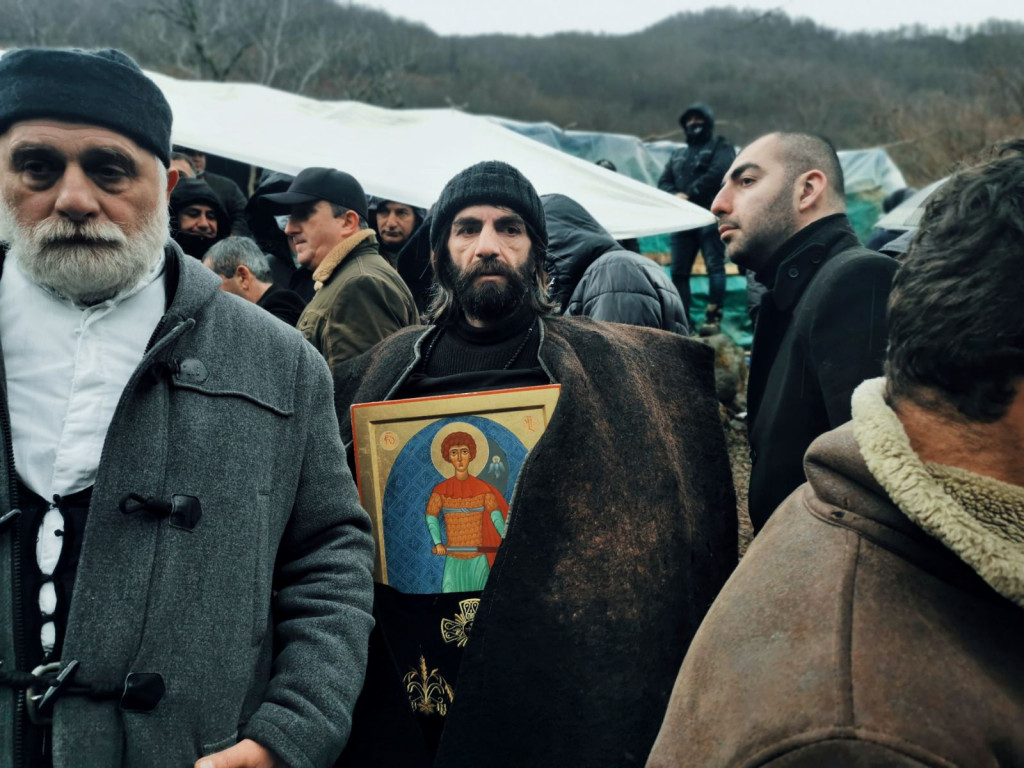
Fighting Economic Imperialism
Beyond land grants, the government’s gifts to ENKA include allowing it to plunder local water resources. In addition to the Rioni River and its tributaries, the company will have the right to draw water from the Tskhenistkali River, without any financial compensation.
What does the Georgian population get from this bitter trade? The argument of so-called energy autonomy is undermined by the fact that the operating company will have no obligation to sell the electricity on Georgian territory after 15 years. Even within the first 15 years, it will have the right to export the energy produced for four months a year. And some residents argue that the agreed electricity prices in the ENKA contract are actually higher than existing companies charge in Georgia – they fear that selling a chunk of the country’s energy resources to the Turkish corporation will not in fact bring cheaper energy but increase prices.
The struggle acquires an anti-imperialist dimension. Aberrant extraction of natural resources, appropriation of land and water by private capital, devastation of traditional agriculture, dispossession of local families. To this is added a struggle against the “self-colonising” practices of the Georgian government.
“What can we call this except an occupation?” asks Maka, drawing a parallel between the occupation of the valley by ENKA and the long-running occupation of Georgian territory by Russia. In an ironic turn, the anti-imperialist positions of the valley inhabitants have been picked up by politicians who accuse them of xenophobia. On this point, a queer collective responded with a letter of support declaring:
“The struggle of the guardians of the Rioni valley today is the struggle for justice, for common space and for the defence of life. On the other side of the divide is the State, which accuses the guardians of being xenophobic and homophobic even as it calls in the forces of order to defend the interests of business. They are using the ancient method – divide us to rule us.”
The defence of the Rioni Valley is no longer just a local struggle. The struggle continues to grow and creates moments of encounters between the inhabitants of the valley and the inhabitants of other regions, including autonomous collectives, queers, members of the “extreme left”, immigrants, and individuals in revolt.
A major new demonstration is planned in Tbilisi on 23 May 2021. This is part of the fight to retake what has already been delivered to the sacrosanct ‘foreign investor’, and to defend what still remains. In the meantime the guardians watching over the Rioni valley, at the feet of the Caucasus Mountains, keep their vigil every night.
* We thank Anano Nikabadze, a member of the collective of support for the guardians of the valley, for his help.
A message from the collective of support for the guardians of the valley
Facing the tentacles of economic imperialism and of capital’s exploitation of natural resources, which increasingly reach to target the “peripheries”, let us make heard our support for struggles that may seem far away. The rich organising forms of the guardians of the Rioni Valley, even if unknown and alien-seeming for Europe, are much more than just folklore from the East. Where the danger grows escape routes emerge, “Zones to Defend” flourish, as do multiple ways to defend them.
In the name of your collectives, your struggles for the environment and against imperialism and capitalism, your squats and your ZADs, send letters of support, photos, banners and slogans, share your own experiences of struggle, your histories of victory and of defeat, bring your struggles to life alongside those of others.
See also:
News updates in English on the dams project and resistance: https://civil.ge/archives/tag/namakhvani-hpp
Documentary film “Land – Water”:
Part I: https://www.youtube.com/watch?v=5l-JaWVA7d8&t=41s
Part II: https://www.youtube.com/watch?v=Ud5R1GDGBYM&t=38s
